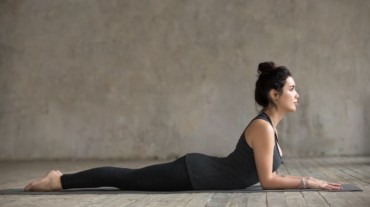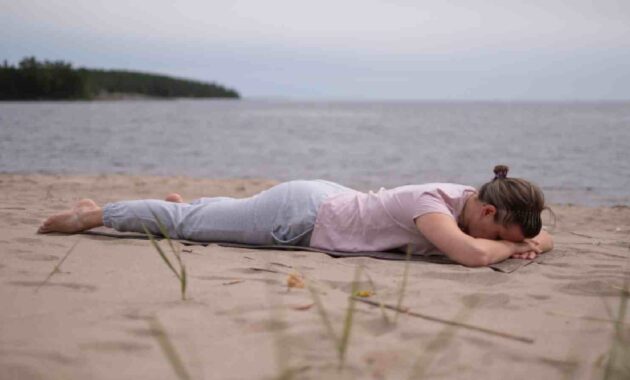Lower back pain can be debilitating, affecting our daily lives and overall well-being. While there are numerous exercises and stretches available to alleviate discomfort, yoga offers a gentle and effective approach. Makarasana, also known as the Crocodile Pose, is a therapeutic yoga posture that targets the lower back, promoting strength, flexibility and relief from pain. Read on to find out how to do Makarasana and understand its benefits in managing lower back pain.
Benefits of Makarasana for lower back pain
1. Strengthens the lower back: Makarasana helps strengthen the muscles of the lower back, promoting better support for the spine and reducing pain caused by muscle weakness.

2. Increases flexibility: Regular practice of Makarasana improves the flexibility of the lower back and hips, enhancing overall mobility and reducing stiffness.
3. Relieves tension and stress: The pose promotes relaxation and helps release tension accumulated in the lower back, making it an excellent stress-relieving posture.
4. Stimulates blood circulation: Makarasana increases blood flow to the lower back region, supplying nutrients and oxygen to the muscles and promoting the healing process.
5. Improves posture: By strengthening the muscles and providing gentle traction to the spine, Makarasana aids in improving posture and alignment, reducing strain on the lower back.
How to do Makarasana for lower back pain relief
1. Begin by finding a quiet and spacious area where you can lie down comfortably on your stomach.
2. Place a yoga mat or a soft surface beneath you. Extend your legs and rest your forehead on your folded hands, allowing your neck and shoulders to relax.

3. Gently spread your legs hip-width apart, allowing your toes to naturally fall outward.
4. Take a few deep breaths, allowing your body to relax. With each exhalation, release any tension in your lower back.
5. Fold your arms and bring your hands near your head. Rest your elbows on the floor, ensuring they are shoulder-width apart.
6. Inhale deeply and slowly lift your head, chest, and shoulders off the floor. Slide your elbows forward and bring your chin closer to your chest, maintaining a gentle stretch in your neck.
7. As you lift your upper body, distribute the weight evenly on your elbows and forearms. Avoid placing excessive pressure on your lower back.
8. Hold the pose for 1-2 minutes or as long as it feels comfortable. Focus on deep, steady breaths, allowing your body to relax and your lower back to release tension.

9. Slowly lower your chest, shoulders and head back to the floor. Rest your forehead on your hands and relax in the prone position.
Also read: Stop wincing due to backache, and learn these 5 exercises to strengthen your lower back
Precautions and Tips for Makrasana
* If you have a recent or acute lower back injury or pain, consult a healthcare professional before attempting Makarasana or any exercise regimen.
* Listen to your body and do not force yourself into any position that causes pain or discomfort. Adjust the pose to suit your flexibility and comfort level.
* Regular practice is key. Aim for consistency and gradually increase the duration of the pose as your body becomes more comfortable.
By strengthening the lower back muscles, improving flexibility, and promoting relaxation, this pose offers a natural and holistic approach to managing discomfort. Incorporate Makarasana into your regular yoga practice and experience the soothing benefits it provides for your lower back.
#perform #Makarasana #pain
